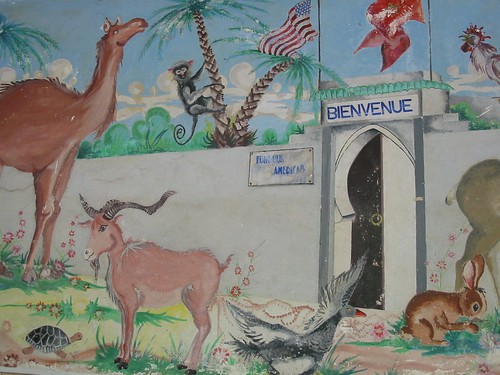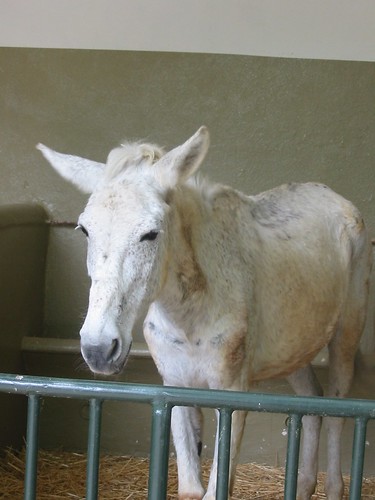The American Fondouk [1] is an animal hospital in Fez, Morocco that was founded in the 1920s and is funded through the Massachusetts Society for the Prevention of Cruelty to Animals [2] (MSPCA). The hospital, which provides care for animals large and small, is staffed primarily by Moroccan veterinarians and staff members, however, it recently came up in the blogosphere due to the blogging efforts of a visiting veterinarian, Dr. Dan Biros of Boston. Dr. Biros, who specializes in opthamology for animals, has been chronicling his work at the Fondouk in an official blog [3]. In a recent post, he discusses [4] the issues of pets in Morocco:
It is not clear to me precisely how much knowledge Moroccan pet owners have about taking good care of their pets. The human animal bond is universal, but there are distinct cultural differences regarding how appropriate pet care should be administered. Issues of animal cruelty abound everywhere and it was for this reason that the American Fondouk was founded more than 80 years ago. I am convinced that the Fondouk’s staff members continuously help the local population understand what it takes to provide adequate care for an animal at every opportunity. This is not an easy task. They work by example. It is very reassuring to see this each day I am here.
On the last night of Dr. Biros’ stay in Morocco, he wrote [5]:
To me, paradise is not the utter fulfillment of one’s desires and the absolute elimination of every bad thing; rather it is the act of giving and receiving, exchanging our gifts to one another no matter how great or small. Paradise is ensuring that we are an active participant, to the best of our ability, in this sometimes crazy world and consciously soaking it all in along the way. No matter how one defines paradise, I feel that part of the definition is the wish for paradise to endure.
Finally, Dr. Biros wrote of his experiences on his last night in Fez:
Alicia and I were invited by a Berber family for dinner and company tonight. A man who sells carpets, a complete stranger we met only the day before in the medina, had us over for chicken couscous, tea and conversation. His wife and two teenage daughters were there and the oldest daughter made henna designs on Alicia’s hands and arms. Henna is a beautiful ornate art of India and Arabia that goes back centuries. We talked of family and work, and shared the meal from a single large bowl as is traditional in Morocco, each of us using our own spoon.
The apartment was modest but had everything one needs, a kitchen, family room and sleeping quarters. It also provided a fine view of the medina from the rooftop, where you felt a bit like a bee in a large honeycomb. As we looked out at the labyrinth of the city we realized how very welcome we are here and at the very same time how very far away from home we found ourselves. How often would something like this happen in Boston? The whole evening was mesmerizing and as dizzying as it was comforting. This is paradise.
Until we write again,
M’a ssalama (peace and goodbye)Dr. Biros

A mural at the American Fondouk
The blogger behind Près du Puits also recently wrote about the Fondouk, where she took her cats to be vaccinated. The blogger said [6]:
In Fez, there is an amazing, almost magical, place. This is the American Fondouk, an animal hospital founded in the 1920s by Sidney Haines Coleman, who cared about the health of the working animals of Morocco. Almost a century later, the Fondouk – which means hotel in Arabic – still treats for free thousands of animals every year. Lots of working animals – mares and donkeys -, but also cats and dogs (though I guess they didn’t treat many of those in the 1920s).
She also shared a number of photographs of the fondouk and its patients:

A patient at the American Fondouk